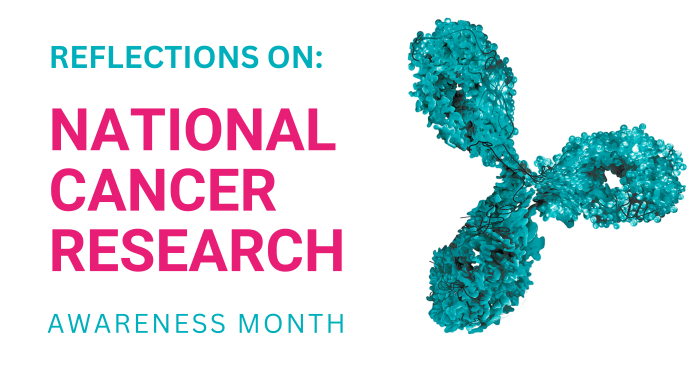Every May, the American Association for Cancer Research marks National Cancer Research Month #NCRM, committed to raising awareness and support around life-saving cancer research. It is a special time to celebrate those who have dedicated their careers to this essential cause, recognize progress that has been made, and acknowledge that there is still a substantial amount of work to be done.
As Vice President of Research Agenus, I am privileged to lead a remarkable team of scientists who share a common goal of advancing cancer research and developing innovative therapies that yield curative responses and profoundly improve the lives of patients, while providing hope and relief to their caregivers. On a personal level, my unwavering ambition is to save lives through groundbreaking cancer research.
The most important lesson that decades of extensive research have taught us is that cancer is a continuous battle between the disease and our immune system. Cancer cells deploy various strategies to evade and weaken our immune system. To empower the human body to win that battle, we must unlock the power of the immune system to attack and eliminate cancer cells. This revolutionary approach is called immunotherapy, and it is changing the way we treat cancer.
The first wave of immunotherapy was a game changer, because it shifted the goal line from giving patients with metastatic disease a few more months to live to some patients experiencing long-term cures. Yet despite these breakthrough therapies, thousands of people continue to succumb to cancer every single day. Families and communities who support these patients demand and deserve new options. My team at Agenus is committed to pushing the boundaries of scientific innovation to advance the next generation of immunotherapies designed to extend curative benefit to a broader patient population and set of tumor types.
This challenge keeps researchers like me and so many others working tirelessly to discover more effective immunotherapy solutions. Our goal is to develop therapies that can effectively combat all types of cancers, including those deemed the most difficult to treat. We are determined to ensure that no cancer patient gets left without effective treatment options. The question is: how can we achieve this?
At Agenus, the process starts with a deep understanding of the complex mechanisms underlying cancer and the immune system. By leveraging our decades-long experience, collective expertise, cutting-edge platforms, technological advancements, and emerging scientific and clinical insights, we can unlock new avenues in immunotherapy research.
Armed with this understanding, one approach we employ is the strategic design of therapies that can overcome critical therapeutic resistance mechanisms in cancer. This involves specific and deliberate changes to a molecule’s design that enhance its ability to harness the immune system and neutralize the mechanisms that enable cancer cells to evade destruction. By strategically designing therapies that can overcome these resistance mechanisms, we enhance their ability to effectively recognize and eliminate cancer cells. This approach not only increases the likelihood of successful treatment outcomes, but also minimizes the potential for recurrence to develop in the future.
Additionally, we recognize the potential of combination therapies that capitalize on the complementary effects of different agents. By strategically combining therapies with distinct and additive mechanisms of action, we can amplify the body’s immune response against cancer. This approach allows us to leverage the strengths of multiple treatments in order to provide a more comprehensive and potent attack against cancer.
One of the most exhilarating aspects of my work is that we are beginning to see how our cancer immunotherapy research is resulting in unprecedented patient benefit in our ongoing clinical trials. A prime example of this is Agenus’ Fc-enhanced CTLA-4 therapy, botensilimab. This revolutionary treatment used alone or in combination with our other therapies is providing much-needed hope to patients who had exhausted all prior lines of treatment and had no other options. The responses are unprecedented. In late stage non-MSI-H colorectal cancer, we have seen more than doubling of the number of patients who survive past 12 months compared to standard of care therapy.
As a researcher, it is extremely fulfilling to witness our innovative therapies behave as designed and deliver breakthrough responses for patients where traditional therapies have fallen short. There is nothing more rewarding than hearing that a patient is cancer free because of a therapy you helped develop. Equally gratifying is knowing that caregivers, who provide vital support throughout the patient’s journey, share in the celebration of this remarkable outcome. This realization serves as constant motivation and drives my relentless pursuit of the next treatment breakthrough.
As we take this moment to reflect during National Cancer Research Month, it is crucial to recognize that progress is not limited to a specific time frame. Every month, every day, presents us with an opportunity to advance toward better treatments and ultimately find cures. The field of cancer research is dynamic and ever-evolving, and I am grateful for the chance to contribute to this ongoing quest for improved outcomes and enhanced quality of life for cancer patients.
To my fellow researchers: let’s continue to push the boundaries of scientific innovation and discover even more effective treatments and cures. Patients are waiting on us.
Source: Dhan Chand/ LinkedIn


